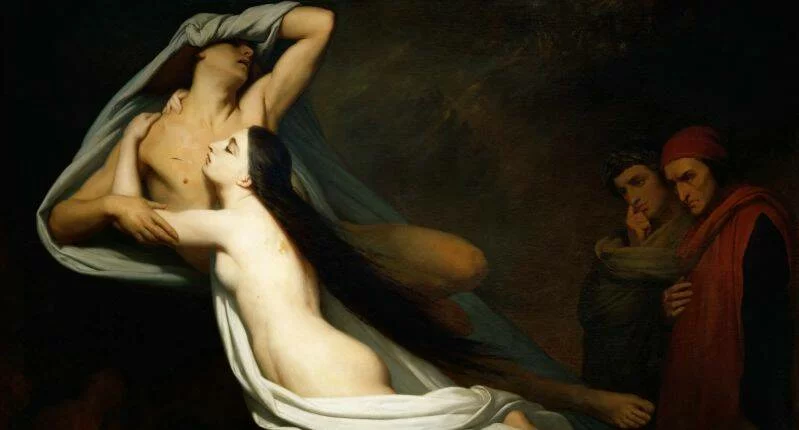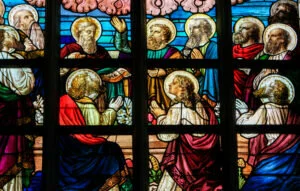Canto IV
Grace in Hell?
Given the laments and curses of Canto III, and how eager the souls are to cross the Acheron, it’s almost easy to miss that the first place the pilgrim arrives at actually lacks much sign of suffering. Virgil describes the doctrine of Limbo in terms of a place designed for those who did not sin, who had merit but lacked baptism into the faith. I’d guess most Protestants assume such persons were either collected, with Adam, Noah, Abraham, and the rest, during the Harrowing of Hell (also an ancient Catholic concept) or that they were somehow brought to Heaven in the first place. Hell is an uncomfortable enough concept to begin with; that the heroes of the faith should be consigned there seems even harsher.
But one way the Inferno achieves its gravitas is through Dante the author’s lack of sentimentalism. He puts friends and mentors in Hell, people he himself would not wish to find there. There is a strict justice at work that elevates the poem above Dante’s personal feelings, as much as his view of divine justice often vindicates him, too. Limbo, then, holds in tension truth and grace: these souls not only were not baptized but did not know God, so Christ leaves them behind when he visits Hell. Yet, they are permitted to rest in green fields and discourse, merely longing for the Heaven they missed but not suffering.
It is moments like these where Dante works to establish the authority of his vision of Hell. Rather than pick and choose his favorite thinkers and people, he holds himself to a very strict code of restricting Paradise to those under God’s grace. It’s like he’s saying, “Look, this isn’t about what I do or don’t want but about God’s justice.” While we can identify specific villains from Dante’s personal life, the sometimes surprising rigidity of his judgment serves to distance the story from his biography and elevate the allegorical force: it gives the poem moral seriousness that, even if we need to read it through the lens of metaphor, we read it in relation to ourselves as much as medieval Italian society or Roman Catholicism.
The Problem of Metaphor in Hell
As winter starlings riding on their wings
Form crowded flocks, so spirits dip and veer
Foundering in the wind’s rough buffetings,
Upward or downward, driven here and there
With never ease from pain nor hope of rest.
As chanting cranes will form a line in air,
So I saw souls come uttering cries—wind-tossed,
And lofted by the storm. (V.37-44)
Metaphor is arguably the constitutive unit of poetry. Words, of course, are more fundamental, but prose broken off into basically rhythmic lines rarely resonate with us as actual poetry. Sometimes we get scrupulous and call them “verse” as opposed to poetry, and if they rhyme in a more or less mechanical or comical way, we may call them “doggerel.” It’s when we get words to mean things we’re not used to them meaning that poetic potential opens up.
in the comparison of one thing to another, the poet requires the reader to make an imaginative leap
There’s a great, ancient tradition of thought about this, but the short explanation for metaphor’s power is that in the comparison of one thing to another, the poet requires the reader to make an imaginative leap, and in that leap, the poet can accomplish surprising effects not possible with more direct description.
In these two similes (simile is a form of metaphor) in Canto V, Dante compares the flying souls to first a flock and then a line of birds. I find these comparisons striking because the vehicles of the metaphors, the birds in flight, connote grace and beauty, whereas the pilgrim clearly observes a scene of distress and lament. Can there be beauty even in Hell? Or is this a beauty only of perspective? Or is it even possible that seeing the flight of these souls as beautiful, even briefly, is part of the pilgrim’s initial errant way of thinking which the journey of the whole poem will correct?
It’s unlikely that Dante believed beauty could be perspectival, but he may want us to see that the way we look matters, that some ways of looking—the poet’s, chiefly—can see what others cannot. We can also notice how jarring the comparisons are. The starlings crowding together in their murmuration and moving in a dance of unity and difference become souls buffeted by wind—not a dance but a struggle. The singing cranes—”chanting” even suggests a second layer of meaning of monks marching and chanting—become wailing spirits. The clash of images points up the distance between these souls and even the common grace of living.
Canto V
The Lovers
You can’t talk about Inferno without talking about the lovers, Paolo and Francesca. Leithart writes well about this, and any other scholarly commentary can develop its significance at length. The gist of the literary and moral significance of the scene is that Dante is reframing the courtly love tradition, a tradition in which he himself had been a noted participant, as he describes in part in his earlier book, The New Life. Though by writing in Italian he aligns the Commedia with love poetry, putting these lovers in Hell signals a rejection of the illicit, immoderate love that defines it. Remember, this is the poem of the soul’s journey to the love of God.
This is an important passage for our day, too, however. While we don’t have a courtly love tradition, we do have the “romantic love” tradition that is a kind of bourgeois version of the same tendency to idolize earthly love and to require more out of it than it was designed to provide. Rod Dreher is admirably candid about this in How Dante Can Save Your Life, As a young man, he tried to leave his faith behind and to “free” himself from its “rules,” which meant he learned the hard way that “[a]ll the lies I told myself, and that our culture tells us, about what sex is for left me feeling hollow and unsatisfied.” Sex divorced from love, he realized, “was destructive to me and to the women I had been with. . . . I was trying to banish that guilty feeling so I could be as free as I wanted to be and thought I had a right to be, [but] I was killing off the most humane part of myself”—that is, the part that loves.
It’s hard not to sympathize with Francesca and Paolo, as the pilgrim does; the notion that love is a force beyond our control or will runs deep in our cultural imagination. Many of us grew up on narratives centrally about finding “true romance” or that sealed the protagonist’s victory with a marriage. Of course there’s a nugget of good creation theology there: we are made to love and loving others actualizes a deep part of our being. But it does not follow that therefore love has no reason to it. Rather, all reasoning proceeds according to a deeper logic of values and desires (e.g., the desire to be truthful, or to only make safe, materialist interpretations of experience, or to defend some person or ideal). For Dante, I think—and here I’m echoing most commentators—the heart gives reason its purpose, so it is of utmost importance what the heart loves and how one acts on it. Virtuous love must love the right things, and the virtuous lover must remain responsible within his or her love.
Pitiable as she may be, Francesca speaks as if she bears no responsibility for what has happened to her. Her only fault is in being a “gentle heart,” that is, a person of a delicate and sensitive nature. Love, she claims, “seized” Paolo and “made my heart burn / With joy so strong that as you see it cleaves / Still to him, here.” But she only acted, in her view, as directed by love, “which absolves / None who are loved from loving.” Note how she subtly splits the blame between Love (Eros, Cupid) and Paolo: he loved her first, and she was constrained by Love to love in return.
Similarly, she blames a book for infecting them with love, and the book, significantly, told the story of another “by love constrained.” I find the narrative here entirely compelling, though: the friends sitting together, reading; the chance, shy looks; the suggestion of the text; and then the erotically laconic line, “that day we read / No further.” That line is as good as any illustration of the less-is-more principle of representing the erotic, but we can’t forget that this soul is in Hell. The seductions of the verse put us by the sympathetic pilgrim’s side. He’s so worked up that he faints, an unexpected and thus comical moment. Whether he faints for compassion or distress at learning where such love will land you, he needs to be disabused of his idolization of romantic love.








Comments
Be the first one to make a comment!